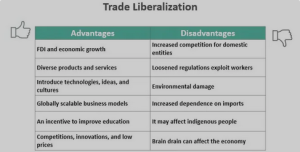Trade liberalization, which involves reducing barriers to international trade, can have both positive and negative effects on developing economies. The purpose of this study is to highlight some of the effects of trade liberalization on developing economies:

Effects Of Trade Liberalization On Developing Economies
Table of Contents
TogglePositive Effects:
- Increased Economic Growth:
- Access to Larger Markets: Trade liberalization provides developing economies with access to larger markets, fostering economic growth through increased export opportunities.
- Efficiency and Productivity Improvement:
- Competition and Innovation: Increased competition can drive efficiency and innovation within domestic industries as companies strive to become more competitive in the global market.
- Technology Transfer:
- Access to Advanced Technologies: Trade liberalization facilitates the transfer of technology and know-how from developed to developing economies, helping the latter adopt advanced production methods.
- Diversification of Exports:
- Reduced Dependence: Developing economies can diversify their exports, reducing dependence on a limited range of products or trading partners. This diversification can enhance resilience to economic shocks.
- Foreign Direct Investment (FDI):
- Attracting Investments: Trade liberalization can attract foreign direct investment, bringing in capital, technology, and expertise that can contribute to economic development.
Negative Effects:
- Displacement of Domestic Industries:
- Competition Challenges: Domestic industries may face challenges in competing with more established and efficient foreign counterparts, leading to the displacement of local businesses.
- Income Inequality:
- Unequal Distribution of Gains: The benefits of trade liberalization may not be equally distributed, potentially exacerbating income inequality within the population.
- Vulnerability to Global Economic Fluctuations:
- External Shocks: Increased exposure to international markets can make developing economies more vulnerable to global economic fluctuations and crises.
- Dependency on Global Markets:
- Volatility Risks: Relying heavily on global markets exposes developing economies to the risks of market volatility, changing demand patterns, and fluctuations in commodity prices.
- Social and Cultural Impacts:
- Cultural Homogenization: Increased trade can lead to the dominance of globalized cultural influences, potentially undermining local traditions and identities.
Conclusion:
Trade liberalization can be a powerful tool for economic development, but its effects on developing economies are complex and multifaceted. Policymakers must carefully design and implement policies that address both the opportunities and challenges associated with increased international trade.
